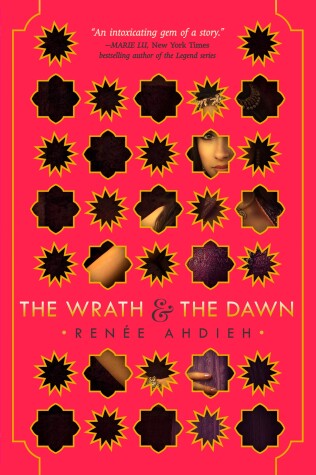Reviewed by Amber (The Literary Phoenix) on
While I haven’t read The Arabian Nights, I am well aware of its framework. Scheherazade’s stories that run from one night to another, preserving her life on the basis of basic human curiosity, is a fantastic foundation for a retelling. Going into The Wrath and the Dawn, I expected a book full of tales and a lot of tension about will-she-or-won’t-she die. While The Arabian Nights definitely served as the launching pad for this novel, the theme did not continue through the story. We hear the tales of Agib and some of Aladdin’s, and we know that the monstrous Caliph has killed his previous wives. After the few initial chapters, however, this falls more into a love triangle romance than it is an adventure story.
I will say there is nothing wrong with the way the plot diverted. It’s a good enough tale… it just wasn’t the one I expected.
Like both The Flame in the Mist and The Beautiful, I have very mixed thoughts about Renée Ahdieh’s writing. On one hand, it’s very pretty and evocative without being gratuitous or flowery. On the other hand, I find it lacks a certain depth to it that makes me feel like I’m only skimming the surface. It feels like looking at pictures of a place instead of really being there. I like it, but at the same time, I am left unsatisfied. I think Renée is the only YA author I’ve run across that makes me feel this way, and it’s frustrating because… I want to be in love with these books, but they are just a little too unsubstantial to be perfect.
Characters, in particular, left me wanting. As a character-reader, I like them to grip my heart and stay with me. Neither Khalid or Shahrazad did that. We spent more time in dialogue with them than anything else, and there weren’t the sort of emotional reactions that make a character feel well-rounded. My experience has been that this is just the way Renée Ahdieh writes – that said, I do see this as something that has improved the notebooks she has written. The Wrath and the Dawn is her debut, so I do expect to find some nitpicky things here, and I’m glad to note the way she has grown as a writer.
In regards to characters as well – I always feel like she stretches herself too thin – telling too many stories but not giving herself the time to flesh them out. We’ve got minor characters in here like Despina, Jalal, and Jahander who have their own dramatic storylines, but we see very little of them, and there’s a lot of telling in their development. At this stage, I’m not sure Despina and Jalal are important to the duology, but their arc didn’t add anything to The Wrath and the Dawn for me.
So, while I liked this book enough to read the sequel, at the end of the day it just didn’t meet my expectations. Which happens sometimes with hyped books, and books that have been on my TBR for years. By all means, it was still a pretty good book! I appreciate that Renée Ahdieh went with a story that isn’t often used for retellings and the atmosphere was a fun change.
Reading updates
- Started reading
- 7 September, 2019: Finished reading
- 7 September, 2019: Reviewed
